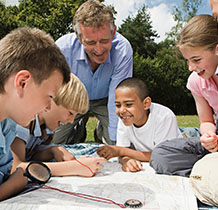Resource Database

Click on a topic or use the search box below to look for a listing:
There are 488 resources. Displaying 10 resources per page.
The National Afterschool Association has created a Pinterest Board featuring parent communication ideas. Pinterest is a pinboard-style photo-sharing website on which you can browse, save, and share ideas. The parent communication resources include ideas for parent resource centers, parent communication templates, and activities that parents can do with their student to support academic achievement.
View Resource
Every Hour Counts, formerly the Collaborative for Building After-School Systems, has developed a comprehensive set of messaging resources to help afterschool leaders discuss afterschool and other expanded-learning opportunities with stakeholders. They have resources to help afterschool professionals explain the role of expanded-learning in supporting student success, communicate about the impact of high-quality afterschool programs on attendance and graduation rates, academic performance, and social and emotional learning, and slides from a webinar addressing frequently asked questions about developing a message for your afterschool program.
View Resource
This updated report from the Annie E. Casey Foundation underscores the importance of ensuring that children, especially those living in poverty or in impoverished communities, develop proficient reading skills by the end of third grade. The research in the report supports the link between reading deficiencies and broader social consequences, and it shows how low achievement in reading impacts an individual's future earning potential. The full report and an executive summary are both available on the Annie E. Casey Foundation’s website.
View Resource
Academic Enrichment
The U.S. Department of Education’s You for Youth team has collaborated with afterschool practitioners and leaders to develop a family guidebook template for 21st CCLC grantees. Creating a family guidebook offers a way for programs to inform families about policies and procedures, and it also helps families become more involved in afterschool activities. This template provides suggestions, in an outline form, of possible components to include in your program’s family guidebook.
View Resource
If you are looking for new ways to use technology in your afterschool program, check out the American Society for Innovation Design in Education’s blog. A recent post lists 20 ways that educators can use Vine-a mobile app that enables users to create and post 6-second clips-in education. Suggestions include applications for educators and projects for students.
View Resource
Technology
Did your students finish their writing activity 10 minutes early? Do you have some down time before the computer lab is available for your group? The National AfterSchool Association has some suggestions on transition or wait time activities to keep students busy. The activities vary in the amount of space and movement involved, allowing practitioners to find a game for just about every situation.
View Resource
Classroom Management
This article examines urban students' experiences in Gaining Early Awareness and Readiness for Undergraduate Programs (GEAR UP), an afterschool college readiness program. GEAR UP is a federally funded program designed to prepare low-income students to enter and succeed in postsecondary education. The article is based on interviews with 10 program participants. Themes that emerged among interviews include navigating the college system, expansion of career options, counseling relationship, personal insight, and future orientation. There is also a discussion of implications for school counselor preparation and practice.
View Resource
 "A subscription or fee is required to access this resource.
If you would like to read the rsource you can purchase it from the publisher or
ask your local library if they subscribe to the publication or can order a copy."
"A subscription or fee is required to access this resource.
If you would like to read the rsource you can purchase it from the publisher or
ask your local library if they subscribe to the publication or can order a copy."
Published in 2009, this practice guide from the U.S. Department of Education’s Institute of Education Sciences provides five recommendations to help district and school administrators, out-of-school program providers, and educators design out-of-school time programs that will increase learning for students. It describes the research supporting each recommendation, how to carry them out, and how to address roadblocks that might arise in implementing them.
View Resource
Program Management
Developed by ExpandED Schools by TASC, this video and accompanying one-page overview explains how a Brooklyn school added 3 more learning hours to the school day for 500 students each year. The video explores the costs and the funding sources that the school sought. In addition, the one pager provides an overview of challenges and recommendations for schools seeking to extend learning time.
View Resource
Program Management
This set of data sheets from the Wallace Foundation helps afterschool leaders and stakeholders use data more effectively. The first data sheet provides an overview on the use of data in afterschool. The remaining five offer information on using data for advocacy work, assessment and program improvement, accountability, identifying and addressing gaps in programming, and data-sharing strategies. The resource is designed for city agencies, afterschool program providers, intermediary organizations, and others.
View Resource
Program Management
There are 488 resources. Displaying 10 items per page.
- Academic Enrichment
- Afterschool Enrichment
- Classroom Management
- College and Career Readiness
- Diverse Learners
- Family and Community Engagement
- Program Management
- Social-Emotional Learning
- Sustainability
- Technology
Subscribe to the Illinois Quality Afterschool newsletter and resource bulletin.
